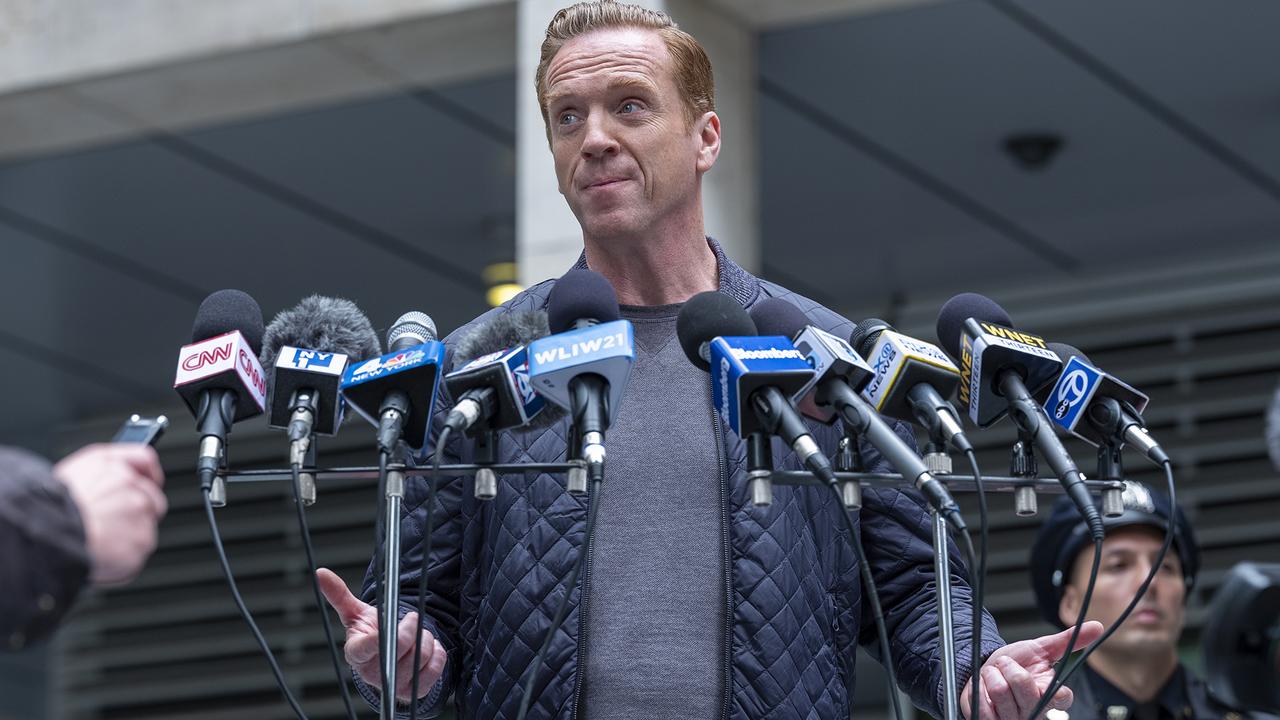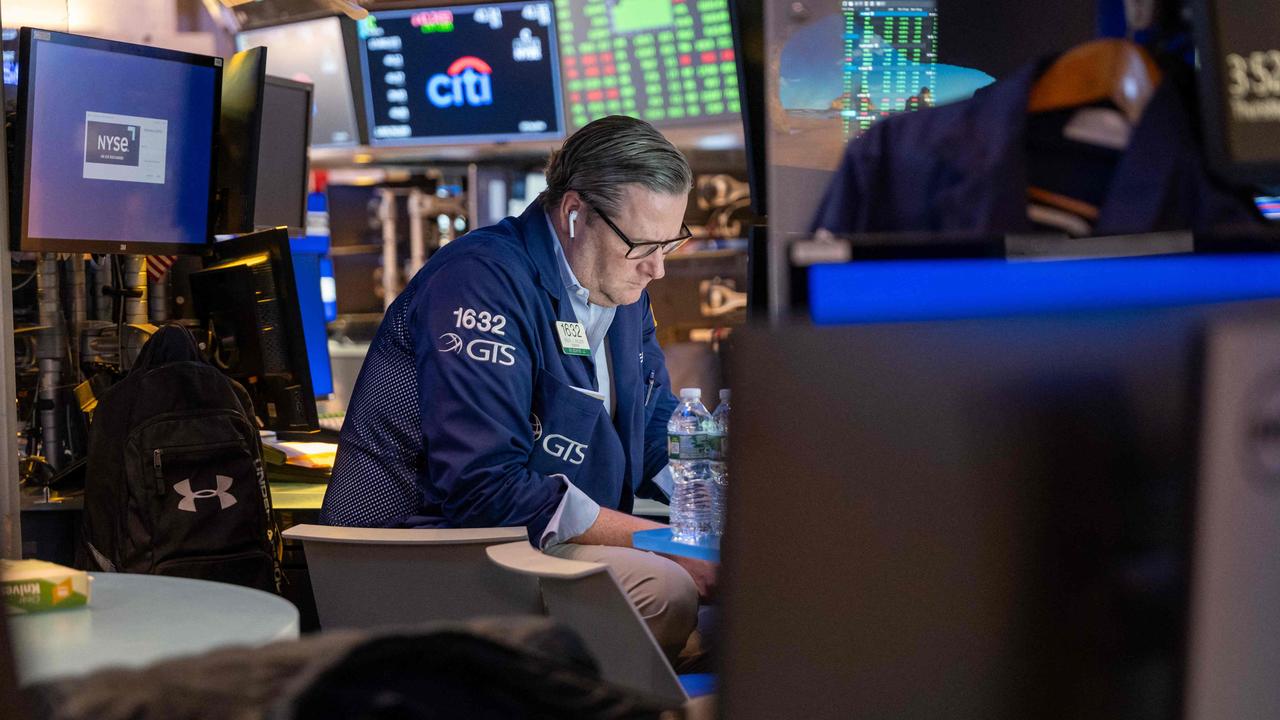Daniel Loeb of Third Point spoke at the Sohn Hearts & Minds Investment Conference in Sydney. Picture: Bloomberg
When Damian Lewis, the actor who plays the ruthless hedge fund boss in the drama series Billions was looking for inspiration, he sat down with Daniel Loeb.
That’s the reputation of the Wall Street investor who has taken on the might of corporates from Shell, Disney and Nestle – all in the name of making a financial killing.
Loeb, the founder of the $US11bn ($17bn) Third Point fund, was speaking at the Sohn Hearts & Minds conference in Sydney, the investment conference that raises funds for medical research. It was less the Billions character Bobby Axelrod appearing, rather the measured financier-turned philanthropist, however the insights were just as sharp.

Damian Lewis as Bobby ‘Axe’ Axelrod in the drama series Billions. Picture: Showtime
Third Point famously made a windfall in betting on Greek bonds following the Eurocrisis, making big calls shorting tech in the lead-up to the dot.com crash, and buying beaten down stocks during the GFC and Covid crashes. His fund has missed much of the initial wave in AI, although it does have exposure to firms like Amazon and Microsoft.
One of his big moves in the past year was moving into Europe investment bank UBS after it was effectively forced by Swiss government authorities to buy out crisis-hit rival Credit Suisse in March this year. UBS effectively paid $US3bn for somewhere between $US50-70bn of assets. UBS shares initially collapsed 16 per cent on the deal, but are now more than 40 per cent from their bottom.
“Regardless of what haircut you used, it was a good deal,” he says.
Loeb is more widely known for activist pitches that target lazy companies. He seeks a seat in the boardroom or pushes companies to sell down assets. His letters to investors don’t hold back, he once referred to the CEO of the company as being the “CVD” or chief value destroyer. Other executives at times were derided as belonging to the “lucky sperm club”.
Loeb says the approach initially was designed to leverage social pressure on the companies, particularly as when he was starting out, he didn’t have the capital to go after bigger companies.
“It was very effective at the time,” he says. “I would say we’re at the point now where we, our record in activism speaks for itself. I think the management teams, the CEOs, the good ones, anyway, see us as a useful sounding board that want to hear our thoughts on capital allocation, on benchmarking, and on how they can better present and communicate to the shareholders.”
Loeb says he is much more collaborative these days. But it does help to have a carrot and potential stick outstanding because “we are capable and willing to fight a proxy contest if necessary”.
After his speech, The Australian had the opportunity to ask Loeb if he believed companies were playing it too safe in a world of higher rates.
However, he was prepared to push back here. In general, Loeb thinks corporates are reacting well to a tougher environment after the Covid pandemic.

Daniel Loeb says good stock picking is investing against the crowd. Picture: Getty Images/AFP
“You’re seeing more companies focused on sustainable capital. I don’t mean environmental sustainability, but financially cutting costs, reducing debt, making sure that they don’t run into trouble. I wouldn’t say that there’s a lazy tendency in this environment.”
Like chasing Greek debt or unloved stocks, Loeb says one of the hallmarks of a good stock idea is betting against the crowd.
“Unlike something like AI, where you just say ‘wow, that’s amazing. Where do I sign up?’ I (like) an idea that you kind of go, ‘Yeah, I don’t want to be anywhere near that’.”
Loeb’s portfolio is now being built around opportunities in credit. In a higher interest rate environment, corporate bonds are being mispriced. So too are opportunities are arising in how companies are dealing with debt.
“There’s a massive amount of deleveraging. Every company that we own and follow is aggressively paying down debt with free cash flow, or opting for debt pay downs, rather than share repurchases,” Loeb says.
FULL COVERAGE: 2023 Sohn Hearts & Minds Investment Leaders Conference
Some companies that comfortably ran with medium levels of debt for years are now being punished for this and are trying to aggressively pay down debt.
“The opportunities won’t come from defaults as much as they will come from companies that maybe had a little bit of a hiccup at the same time that they have a need for restructuring, they’re going to need fresh capital to come in, or their existing credit to rollover into a new line.”
Loeb’s stock pick is something less glamorous. A small underperforming US beauty retailer Bath & Body Works that Loeb pressured and ultimately took a seat on the board. It sells beauty lotions and scented products and is moving into haircare. It has millions of customers going into their stores every month and has a new management team. He describes it as a hidden jewel with earnings potential.
“It is a good example of an unpopular levered smaller cap that is just throwing off a ton of cash and will be in a position to buy back a lot of equity by next year,” Loeb says.
Big themes
As glimpse of where market themes are going, this year’s Sohn Hearts & Minds conference had a distinct flavour. Leading stock pickers from a string of local and offshore managers from the Future Fund, IFM Investors, Ellerston Capital, Tribeca Investment to Bridgewater detailed their pitches. Investment picks were mostly international, with Australian-US listed medical play Resmed or ASX-listed uranium group Nexgen Energy the only local heroes amid a dozen or so tips. Other picks put value over growth in a high inflation market with stocks being under-appreciated by investors as the ones likely to deliver more potential upside.
The biggest shift was out of equities and into cash and other assets.
Tech investor Cathie Wood-backed cryptocurrency tracker, the Grayscale Bitcoin Investment Trust. Tellingly, one of Australia’s biggest investors, the $200bn Future Fund, has looked past equities and into private credit – effectively cash. The Future Fund’s chief investment officer Ben Samild says diversifying is the single best move that investors can make right now. Likewise, Bridgewater’s Atul Lele says there are better returns outside of equities in a highly inflationary environment.
The Hearts & Minds event has a serious side. It has established itself as a day of speed dating for markets nerds, all built with charity at the core. Since the launch of Hearts and Minds by Matthew Grounds, Guy Fowler and Gary Weiss in 2016 the event has so far raised more than $60m that has been channelled to Australian medical research. Next year, the show goes on the road to Adelaide.
This article was originally posted by The Australian here.
Licensed by Copyright Agency. You must not copy this work without permission.